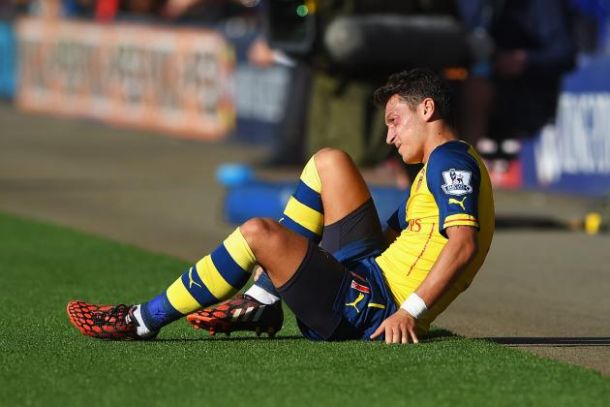Arsenal’s £42m record signing Mesut Ozil has been ruled out for up to 12 weeks with a knee injury, adding to the Gunners' injury woes.
The former Real Madrid star reported to German International duty with a knee complaint, and an MRI scan in Munich on Wednesday afternoon confirmed that the midfielder had damaged his left-knee joint.
The German Football Association released a statement on their official website, confirming the prognosis: "The MRI examination revealed a partial rupture of the outer band of the left knee joint."
They added: "The treatment is six weeks of immobilisation of the knee joint. Mesut Ozil is likely to be out 10 to 12 weeks."
Ozil will miss German’s European Championship qualifiers against Poland and the Republic of Ireland, as well as friendlies against Gibraltar and Spain in November.
In addition, the World Cup winner will be absent for the remainder of Arsenal’s Champions League group-stage fixtures, on top of key Premier League clashes against Manchester United and Liverpool.
This merely adds to Arsène Wenger’s injury crisis; he is already without seven first-team stars, including skipper Mikel Arteta and last season’s player of the year Aaron Ramsey. The French duo of Olivier Giroud and Mathieu Debuchy are also both side-lined for three months due to ankle problems.
Fortunately, Theo Walcott has returned to full training following a nine-month lay-off. The former Southampton star sustained an anterior-cruciate ligament injury in January’s third-round 2-0 FA Cup win over Spurs.
Nevertheless, Ozil’s injury raises more concerns and questions about the club’s training methods. German medical expert Shad Forsythe was brought in over the summer and was tasked with rectifying Arsenal’s on-going injury problems, although thus far, there is little evidence that the German’s methods have had a significant impact.
The Gunners have played just 12 competitive fixtures this season, yet have lost Ramsey, Debuchy, Giroud and Ozil to long-term injury. However, arguably the bigger concern is why Ozil’s injury was not picked up sooner.
The enigmatic midfielder has so far endured a mixed-campaign; he’s been frequently deployed on the wing by Wenger, in order to accommodate both Ramsey and Jack Wilshere in the central-midfield area, although this has been to the detriment of Ozil’s performances.
Despite a very lacklustre performance against Chelsea last Sunday, there were signs that Ozil was regaining both form and confidence. In the two matches he’s been deployed in his favoured central role, against Aston Villa and Galatasaray respectively, the 25-year-old has recorded one goal and two assists. He has also forged an extremely encouraging partnership with Danny Welbeck. Therefore, the timing of his injury, is made all the more frustrating.
Fortunately, Wenger has a plethora of attacking midfield options, but with his current predicament, this strength in depth will be instrumental in stabilising the Gunners’ season. Santi Cazorla has been frustrated by his lack of first-team football this term, but after excellent displays against Galatasaray and Chelsea, the diminutive Spaniard will surely get a regular run in the side.
Tomas Rosicky, who has made just the solitary start this season, in Arsenal’s Capital-One-Cup defeat to Southampton, could also be used more frequently; his experience may be invaluable as the hectic winter schedule begins to take its toll. With Theo Walcott returning from injury, Wenger may be tempted to use Alex-Oxlade-Chamberlain in a central area. The Frenchman has always maintained that Chamberlain has all the attributes to play in the central-midfield role.
Earlier this year, Wenger said: “His future will be there in central midfield, in a deeper role, because he has a good long ball and penetration from deep. He has good quality to distribute and penetrate individually – very similar to Steven Gerrard.”
However, Ozil’s absence will be a major blow for the Gunners. Although he has drawn criticism for his languid style of play, he remains Arsenal’s most creative source. He is such an intelligent player; his movement and vision will be sorely missed.
It’s particularly frustrating that Gunners’ fans will have to wait a while longer to see Mesut Ozil and Theo Walcott link up together on a regular basis. Walcott’s return could have been the tonic to rejuvenate Arsenal’s record-signing. Ozil thrives when players make runs in behind opposition defences; he relies on intelligent movement and pace, which Walcott has in abundance.
The pair played together on just six occasions last year; Ozil recording four assists, with Walcott netting five goals. They worked extremely well together, gelling instantly, although injuries prevented the partnership from blossoming further.
Injuries last season arguably cost Arsenal a fantastic opportunity of winning the Premier League title; the prolonged absence of Walcott and Ramsey hit the Gunners particularly hard. However, their injury problems have exacerbated rather than improved this season, which is concerning and simply unacceptable.
The causes for Arsenal’s persistent injury problems are not abundantly clear, is it down to mismanagement, or is it purely bad luck? Wenger has always been meticulous in his preparation, but this injury crisis is not uncommon. However, training methods and squad management must all be analysed thoroughly and subsequently rectified if issues are identified. The North Londoners will be hoping that Forsythe’s methods will soon take effect, because these fitness worries are preventing them from consistently competing on all fronts.






































